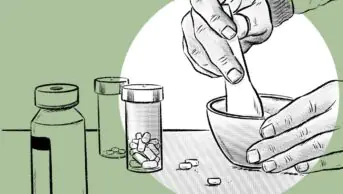
SHUTTERSTOCK / THE PHARMACEUTICAL JOURNAL
After reading this article, you should be able to:
- Identify the roles and responsibilities of a designated prescribing practitioner;
- Demonstrate competence in building a relationship with the trainee;
- Interpret and apply the essential characteristics of being an effective clinical supervisor.
In 2006, UK legislative changes enabled pharmacists who complete the appropriate postgraduate qualifications to become independent prescribers1 and this continues to be the prescribing route for existing qualified pharmacists. In 2021, however, the General Pharmaceutical Council (GPhC) amended the learning outcomes for the initial education and training standards of pharmacists to include independent prescribing, recognising this as an essential skill for pharmacists. From 2026 — the 20th anniversary of the original legislative change that first opened the profession to prescribing — all newly registered pharmacists will join the register and legally prescribe medicines from their first day of practice.
Regardless of the route to becoming a prescriber, pharmacists are required to complete 90 hours of supervised learning in practice under the supervision of a designated prescribing practitioner (DPP), who provides ‘sign-off’ that they are competent to prescribe.
The GPhC standards and requirements for being a DPP differ depending on whether the DPP is supporting a qualified pharmacist with their postgraduate prescribing qualification or is supporting a trainee pharmacist to meet the new learning outcomes for the initial education and training standards.
The role of the DPP
The DPP role may vary depending on the course being completed, who is being supervised and the sector in which the supervised learning takes place; however, there are some common themes. DPPs are expected to:
- Provide access to clinical experiences that will support development of prescribing skills;
- Provide supervision and feedback to support progress;
- Facilitate multiprofessional experiences;
- Assess prescribing-related skills;
- Be accountable for trainees’ development to enable them to become competent prescribers.
Figure 1 shows the specific DPP requirements relating to the type of pharmacist that is being supervised (i.e. qualified or trainee). There are additional considerations for DPPs supervising trainees as these learners will undergo two types of supervision. The designated supervisor (DS) guides the trainee through the foundation training year and ultimately declares whether the trainee has met the wider learning outcomes and professional standards. The DS also determines if the trainee is competent enough to join the register, whereas the DPP oversees the prescribing component of their training. NHS England states that the DS and DPP can be filled by two separate people or one person; however, the person must meet the defined requirements for both roles. There are core person specifications that apply to being a DS and DPP, as well as additional specifications for the role of DPP. More details on core supervisory specifications can be found in NHS England guidance, published in January 2025.
Figure 1: DPP requirements
The DPP model for supporting a trainee pharmacist recognises that there is no expectation to superimpose the DPP’s scope of practice on to the trainee; therefore, the three years of expert prescribing experience is not required. It allows for the creation of a wider pool of suitably qualified professionals to support training through recognition of the wider attributes and generalist skills, which is aligned with a robust process2,3.
What makes a good DPP
The expansion of pharmacist roles and the introduction of prescribing skills into foundation training has led to a significant rise in the number of DPPs required. It is also not uncommon for there to be a shortage of personnel available to take on this function, presenting a potential workforce challenge. To meet this growth in demand, employers are looking to their existing prescribers to become DPPs; however, for this to be an effective strategy, there will need to be appropriate training, support and time made available4.
Although the DPP role may feel new or unfamiliar to some in the profession, it is important to recognise that many pharmacists are already undertaking supervisory aspects (e.g. as a mentor, clinical or peer supervisor) and will possess relevant experience and skills that can be transferred to the DPP role.
A report by Rothwell et al.5, published in 2021, identified several important factors for an effective clinical supervision relationship, including creating and developing a trusting relationship between the supervisor and supervisee that recognises the supervisor as the ‘expert’, that good relationships improve job satisfaction, and that the supervisor must have sufficient time to undertake the role. For more details on these characteristics, see Box 1. The report describes clinical supervision as an evaluative relationship that “extends over time and has the simultaneous purposes of enhancing the professional functioning of the more junior person and monitoring the quality of the professional services”5.
Box 1: Ten characteristics of effective clinical and peer supervision identified in the Rothwell report
1. When supervision is based on mutual trust and respect;
2. When supervisees are offered a choice of supervisor with regard to personal match, cultural needs and expertise;
3. When both supervisors and supervisees have a shared understanding of the purpose of the supervisory sessions, which are based on an agreed contract;
4. When supervision focuses on providing staff the sharing/enhancing of knowledge and skills to support professional development and improve service delivery;
5. When supervision is regular and based on the needs of the individual, which ideally is weekly — fortnightly at the minimum. Ad hoc supervision should be provided in cases of need;
6. When supervisory models are based on the needs of the individual. This may include one to one, group (i.e. peer supervision), internal or external, distance (which includes the use of technology), or a mix;
7. When the employer creates protected time, supervisor training and private space to facilitate the supervisory session;
8. When training and feedback is provided for supervisors;
9. When supervision is delivered using a flexible timetable, to ensure all staff have access to the sessions, regardless of working patterns;
10. When it is delivered by several supervisors, or by those who are trained to manage the overlapping responsibility as both line manager and supervisor.
How to be an effective DPP
The ‘Independent prescribing pilot programme during foundation training for trainee pharmacists evaluation report’, published in 20246, identified similar themes that form the basis of the following tips on how to be an effective DPP.
1. Clarify the DPP role and what support you should expect to receive
Before meeting with the trainee independent prescriber, it is important that you establish what support you will receive from your employer or equivalent. Agree to the expectations of the role, including how much of your clinical time you will be spending with the trainee, how your existing role will be covered during this period and if there is any protected time for meetings and/or your own professional development.
2. Develop your competence and build confidence
As a DPP, you will be required to facilitate and support learning and assess the trainee prescriber’s competence. These are skills that can be learned and developed, so you should look for training resources that can help you undertake the role more effectively. These resources may include national training programmes for educational supervision or working as a DPP and access to support networks and training offered by universities, employers and integrated care boards — among others.
3. Build your relationship with the trainee
Meet with the trainee early in the process to create a shared understanding of each other’s expectations. This should include gaining agreement over how and when you will meet and clarifying expectations around how you will communicate with each other. There is little evidence in favour of whether a set schedule plan or ad hoc meetings are the best approach. It is more important that expectations are clear6,7.
4. Create a learning plan or contract
Contract learning is a well-established educational approach for supporting healthcare professionals8 to collaboratively structure their own learning and assessment process, providing learners and supervisors with an individualised plan to encourage optimal development9. Creating a plan collaboratively in this way encourages a strong trainee–supervisor relationship from the beginning, moving away from the conventional one-way knowledge transfer that characterises earlier years of education to one more fitting and respectful of adult learners10. This process helps ensure accountability for all involved and allows learners to see the relevance of their objectives, bridging the gap between theoretical knowledge and practical application11.
Formulating an initial plan can be daunting for new DPPs who have not been involved in collaborative development planning previously in their own careers or education. Completing an initial learning needs assessment or a baseline competency review is a valuable first step in gaining clarity on the learner’s starting competence and identifying areas for development.
Some resources to help with this include:
- ‘NHS England: learning needs analysis quick guide’;
- Assessing competency may be specific to a role or clinical area:
- Skills for Health: career and competence frameworks for NHS roles;
- ‘An integrated career and competency framework for pharmacists in diabetes’;
- The Royal Pharmaceutical Society’s (RPS) ‘Designated prescribing practitioner competency framework’.
The level of detail within the plan can be tailored to the needs of the individual and the DPP. Include details of activities that will develop prescribing competence in a meaningful way within the 90 hours of required learning in practice time. Trainees and practitioners may also find it beneficial to include agreed timelines for the completion of the practice learning hours or for submitting evidence.
The course that the trainee is undertaking or tools such as the NHS England ePortfolio may offer useful assessment aids to map requirements. These aids can be helpful in creating a plan to build an effective portfolio and in identifying suitable colleagues to undertake the workplace assessments (e.g. supervised learning events) within your own teams.
5. Build your professional network
A strong professional support network will contribute to a positive learning experience for both the trainee and the DPP, especially those new to educational supervision roles. Collaboration and interprofessional working facilitates opportunities for practice hours with other members of the multidisciplinary team, such as doctors, specialist nurses or dietitians, enabling trainees to experience different assessment or consultation styles and gain a more well-rounded understanding of clinical care and prescribing approaches.
DPPs also benefit from these networks through shared experiences of supervision, alternative methods of competency assessment and peer support in managing their own workload when undertaking the roles. For prescribers new to the DPP role, peers can offer insights that inform their own reflections and practice, as well as reduce stress related to the DPP role.
Although a suitably experienced pharmacist will be able to act as both DS and DPP, should these roles be assigned separately, this can foster a team approach to trainee supervision and allow the sharing of responsibilities.
Reflection in practice
The following reflections provide some personal insights into the DPP role.
Reflection 1: supporting a trainee pharmacist prescriber as a DPP, with a specific scope of practice
Matthew Heppel is an advanced diabetes and endocrine pharmacist and non-medical prescriber (NMP) at Hull University Teaching Hospitals and a clinical associate at the University of Lincoln School of Health and Social Care, providing clinical education within the MPharm programme.
“Since qualifying as a NMP in 2020, I have worked alongside the specialist inpatient diabetes team to deliver clinical care. With a background in dedicated educational roles, with several years as a DS and experience in pharmacy higher education during the prescribing curriculum reforms to accommodate prescribing learning objectives, I was keen to support and better understand the introduction of prescribing training for trainee pharmacists.
I volunteered to take part in a short trial as a DPP within the area of diabetes. My main motivation was to explore how I could create and support opportunities within my service to facilitate the 90 hours of supervised learning in practice ahead of required implementation in 2025/2026.
Although I had several years’ experience as a DS, I had never acted as a DPP. A review of the RPS’s competency framework reassured me that my experience and scope of practice were appropriate. With the help of the diabetes multidisciplinary team, I identified appropriate learning opportunities for a trainee pharmacist. These discussions helped set realistic expectations and ensured a focus on consultation skills, physical assessment and shared decision-making during practice hours.
Creating a prescribing learning plan was initially challenging, as the trainee was unfamiliar with the contract learning approach and required more structured direction. Ultimately, however, formulating a clear plan benefited us both, providing structure for me as DPP and enabling the trainee to independently organise their learning.
The trainee’s main concern was how to balance prescribing training with assessments, evidence writing and revision. It proved difficult initially and affected their wellbeing. In response, the leads of this DPP trial developed guidance that mapped the crossover between GPhC learning outcomes and RPS competencies. This resource proved pivotal in making the training manageable and enjoyable, and I believe it was central to the trainee’s success.
Initially, we focused on observational learning. The trainee shadowed my clinical consultations and physical examinations, and I provided narrative to supplement their learning. We then moved to more active, supervised tasks. I was concerned that limited clinical knowledge might hinder our focus on prescribing skills and found that it did affect case discussions and options appraisals. Reflecting on this, I acknowledged I had not adjusted my expectations from supervising specialist prescribers to supporting a generalist trainee. I refined my approach by screening for more suitable cases and allowing time for background research, and we overcame these barriers. As the trainee progressed and completed more in-practice hours, they gained the confidence and knowledge to handle more complex cases. I was able to support them via both real-time feedback and the usual work-based assessment feedback.
One memorable case involved a young woman with type 1 diabetes admitted with diabetic ketoacidosis in pregnancy. The trainee pharmacist was able to review and identify appropriate anti-emetic agents. We reviewed the rationale together, discussed it with the patient, implemented the change and documented the consultation. The trainee described the experience as a pivotal moment in their prescribing journey, taking clinical pharmacy knowledge from theory to treatment amendment.
Overall, acting as a DPP was both challenging and rewarding. It facilitated opportunities for mentoring and leadership within my own practice and allowed me to support the evolving role of pharmacists in direct care delivery.”
Reflection 2: supporting a trainee pharmacist prescriber as a DPP within a nominate area of prescribing
Rachel Smith was an admissions pharmacist and NMP at Sheffield Teaching Hospitals Foundation Trust at the time of NHS England’s independent prescribing pilot programme for foundation trainee pharmacists.
“The national pilot trial looked like an exciting opportunity to explore the role of a DPP and see how it could be integrated into the trainee pharmacist training programme at Sheffield Teaching Hospitals Foundation Trust, where I worked.
The RPS competency framework specifies that DPPs must be ‘an experienced prescriber in a patient-facing role’ and ‘an active prescriber’, and I fulfilled these criteria. To help me prepare, I completed the DPP e-learning resource by Health and Education Cooperative on NMP. I also attended the training sessions that were part of the pilot and found the meetings with the other DPPs a valuable resource, as they allowed experiences and areas of good practice to be shared.
I was both the DS and DPP for my trainee. The dual role was challenging but allowed me to guide my trainee more effectively, as we spent a large proportion of his prescribing hours together. The success of the dual role is largely dependent on having a good working relationship with the trainee. My first challenge was to demonstrate that prescribing is an extension of a pharmacist’s role rather than being a separate one. It was important to first lay the foundation for effective patient consultations, then appropriate clinical management plans, leading to safe prescribing options.
My trainee had chosen ‘care of the elderly’ as his scope of practice. He saw a wide range of presentations, and we were able to review the patients in the admissions units. He was able to hone his clinical skills under my supervision and integrate into the multidisciplinary teams I was part of. The tripartite meetings between myself, my trainee and academic tutor for the pilot allowed us to discuss progress and areas for development constructively, in addition to our regular meetings.
In my view, the pilot showed that prescribing could be effectively integrated into the existing trainee pharmacist programme and that trainee pharmacists under supervision are able to critically evaluate clinical management plans.”
Further resources
The following resources from The Pharmaceutical Journal build on some of the topics and themes introduced in this article:
- ‘How to be an effective mentor’;
- ‘Educational supervision, assessment and feedback for pharmacists’;
- ‘Entrustable professional activities: a new approach to supervising trainee pharmacists on clinical placements’.
NHS England has resources available to support DPPs in trainee pharmacist prescribing assessment:
Acknowledgements
The authors of the article would like to acknowledgement the support of the Health Education England team for funding and supporting the NHS England independent prescribing pilot project. We would also like to express thanks to the project team: Gemma Quinn, Sallianne Kavanagh, Tim Denby, Patricia Achi and Kristina Medlinskiene.
- 1.The National Health Service (Miscellaneous Amendments Relating to Independent Prescribing) Regulations 2006. The National Archives . 2006. https://www.legislation.gov.uk/uksi/2006/913/made
- 2.It is time to rethink prescribing scope of practice and the DPP model for foundation training. Pharmaceutical Journal. Published online 2024. doi:10.1211/pj.2024.1.305124
- 3.Prescribing Supervision and Assessment in the Foundation Trainee Pharmacist Programme from 2025/26. NHS England. January 2025. https://www.hee.nhs.uk/sites/default/files/documents/Prescribing%20Supervision%20and%20Assessment%20in%20the%20Foundation%20Trainee%20Pharmacist%20Programme%20JAN%202025%20V1.3.pdf
- 4.Support for pharmacist designated prescribing practitioners (DPPs) Position Statement. Royal Pharmaceutical Society. https://www.rpharms.com/recognition/all-our-campaigns/policy-a-z/support-for-pharmacist-dpps
- 5.Rothwell C, Kehoe A, Farook SF, Illing J. Enablers and barriers to effective clinical supervision in the workplace: a rapid evidence review. BMJ Open. 2021;11(9):e052929. doi:10.1136/bmjopen-2021-052929
- 6.Ifunnaya Achi P, Kavanagh S, Medlinskiene K, Denby T, Quinn G. Independent Prescribing Pilot Programme during Foundation Training for Trainee Pharmacists Evaluation Report . NHS England . December 2024. https://www.hee.nhs.uk/sites/default/files/documents/NHSE%20WTE%20Independent%20Prescribing%20Pilot%20Evaluation%20Report.%20December%202024.pdf
- 7.Swartz MK. Promoting Academic and Clinical Success Through Learning Contracts. J Nurs Educ. 2019;58(6):372-372. doi:10.3928/01484834-20190521-11
- 8.Rye K. Perceived benefits of the use of learning contracts to guide clinical education in respiratory care students. PubMed. November 2008. https://pubmed.ncbi.nlm.nih.gov/18957150/#:~:text=Background%3A%20The%20benefits%20of%20contract,lifelong%20learning%20behaviors%20among%20students.
- 9.Parkhurst H. Education on the Dalton Plan. 1st ed. E. P. Dutton amp Company; 1922. https://archive.org/details/educationontheda028244mbp
- 10.Boak G. What Is a Learning Contract? In A Complete Guide to Learning Contracts. Gower Publishing Ltd; 1998. https://www.voced.edu.au/content/ngv%3A41162
- 11.Tsingos C, Bosnic-Anticevich S, Smith L. Reflective Practice and Its Implications for Pharmacy Education. American Journal of Pharmaceutical Education. 2014;78(1):18. doi:10.5688/ajpe78118


